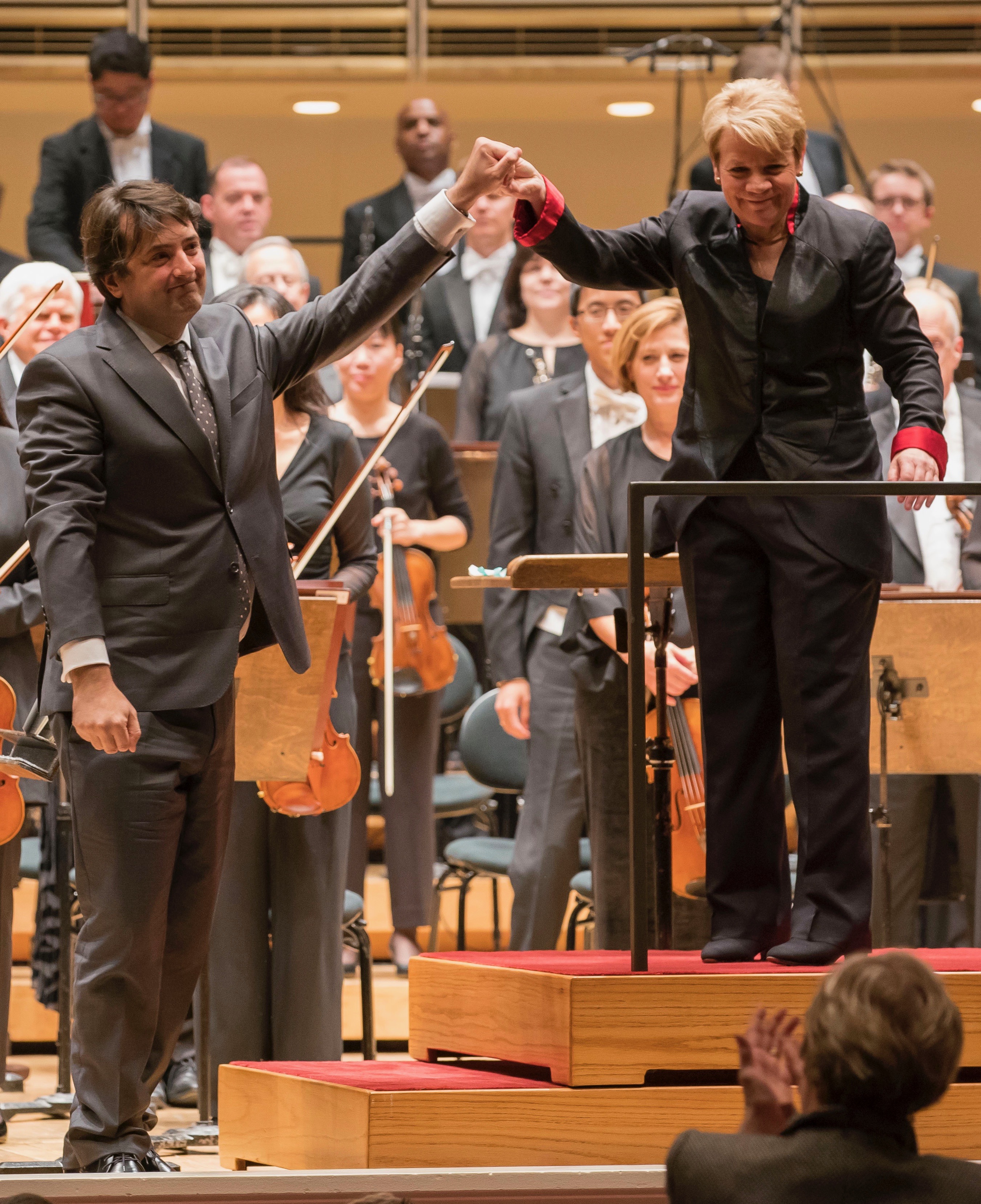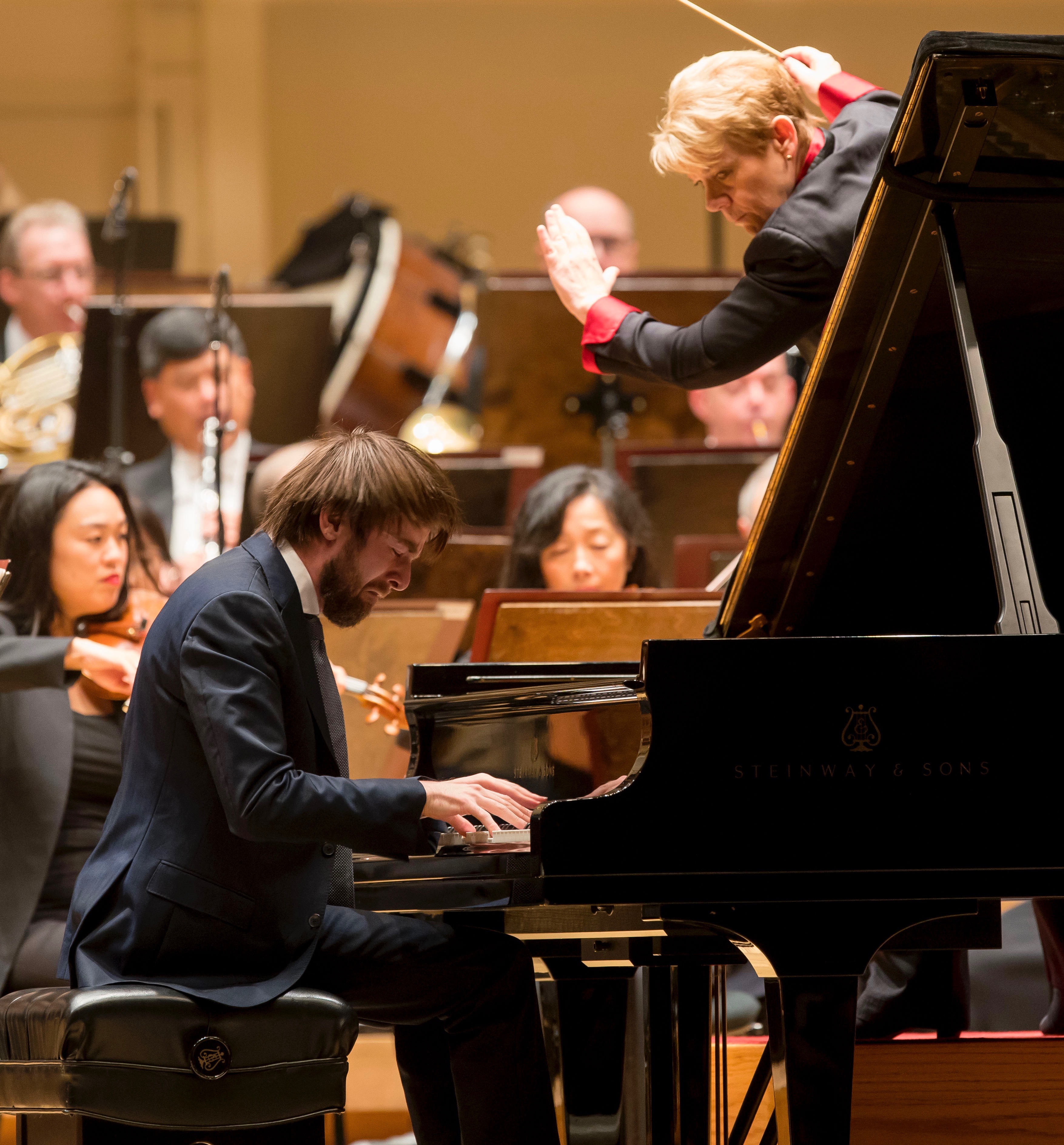A powerful premiere and a great American symphony from Alsop, CSO

This week’s Chicago Symphony Orchestra program led by Marin Alsop has it all: a world premiere, a big American symphony and an appearance by a soloist who is arguably the finest young pianist in the world today.
Yet the results at Friday afternoon’s matinee proved oddly mixed, and not in the way one would have expected.
The first order of business was Bruno Mantovani’s Threnos, commissioned by the CSO and Jennifer Pritzker, and having its world premiere performances at these concerts. Throughout this season, the orchestra is commemorating the 100th anniversary of the Armistice, which ended World War I, and three of the four works on Friday’s program deal directly or indirectly with war and its aftermath.
Written for huge orchestra, Threnos is a substantial work at 17 minutes. While the Greek word refers to a “funereal lamentation,” there is nothing gentle or elegiac about Mantovani’s score. As the composer put it in his program note, this is “a celebration that is at once violent, virtuosic and extroverted.”
Threnos opens with deceptive restraint in skittering percussion shimmers and rattles. A distant militaristic snare drum grows in volume and intensity. The music builds with atmospheric sweep in the full orchestra, swelling, rising and falling, leading to massive strident chords for winds and brass. There is a dominant sense of malign latent violence in Threnos that keeps breaking forth—not least with the epic percussion and staccato brass rolling up to a massive nerve-jangling crescendo.
Fleeting respites surface amid Mantovani’s explosive bursts: a plaintive fragment for flutes and oboes, a seesawing theme for strings, and, especially, a restless, unsettled solo violin that seems to be searching fruitlessly for relief (well played by Stephanie Jeong). Yet the turbulent cacophony always returns in music of greater, more aggressive violence, bursting out in one final climax of roiling, full-metal symphonic fury.
The few CSO commissions of the Muti era have had more than their share of duds. But Bruno Mantovani’s Threnody is a powerful, consummately well-crafted and hugely compelling work.
Alsop, the score’s dedicatee, led the premiere masterfully, bringing out the surging power as well as the reflective moments with impressive force, clarity and momentum. The CSO delivered their best playing of the afternoon in this premiere, putting across the score with polished ensemble and seismic impact. Mantovani’s music deserved better than the polite-to-warm applause it received at Friday’s matinee.
The other main work on the program was Aaron Copland’s Symphony No. 3. Once the most celebrated and often heard symphony by an American composer, the work seems to have fallen out of favor in recent decades. The symphony hasn’t been played by the CSO downtown in 11 years—and not at Ravinia since the third year of the Reagan administration.
Copland’s 45-minute canvas is the composer’s largest orchestral work and has often been called “the great American symphony.” David Diamond explored an even deeper—and darker—vein of wartime sentiment in his contemporaneous Second and Third symphonies, but Copland’s Third remains undeniably a masterwork for all seasons.
Written before and after the end of World War II, the symphony shows Copland very much in his public/populist mode—not least when the composer mines his stirring Fanfare for the Common Man for the finale’s main theme.
Yet despite flirting with rhetoric—as in the Scherzo’s striding confidence and the rousing coda—the symphony avoids any sense of postwar triumphalism. Copland was too good a composer for that, and the big moments are always balanced by passages of musical intimacy— the gentle flute-led lyricism or the characteristic vein of introspective sadness in the slow movement.
Alsop is a lauded exponent of American composers, as shown in her centennial survey of Leonard Bernstein’s music at Ravinia this past summer.
Yet Friday’s matinee offered a sturdy performance of Copland’s symphony rather than a memorable one. Alsop gets points for opening up the finale and restoring ten measures cut by Bernstein, which bring back a theme from the first movement for a more unified conclusion.
The big moments made strong impact and were charted with skill: the rhythmic bite of the second movement, the celebrated Fanfare—majestically rendered by the CSO brass and percussion—and the cumulative buildup to Copland’s grandly affirmative coda.
Perhaps it was the week’s demanding program with a complex premiere to prepare and limited rehearsal time. But there were too many scoring details sloughed over in this performance and far too many loose ends. Balancing of sections was a sometime thing in the first movement and the performance felt garrulous, lacking the kind of polish and technical gleam one routinely expects from these musicians.
Alsop preceded Copland’s symphony with another war-related work, by Frank Bridge. Best known these days as Benjamin Britten’s teacher, Bridge wrote his Lament as a tribute to nine-year-old Catherine Crompton, who perished with the rest of her family on the Lusitania when it was torpedoed by a German U-boat in 1915.
Despite the heartfelt inspiration, the brief work for strings doesn’t plumb much grief or even a vein of deep feeling, sounding like a rather anonymous, pastoral English idyll. Still, it made an apt prelude to the big-boned symphony and was given a sensitive rendering by the orchestra’s strings.
It’s not often that an appearance by Daniil Trifonov is the least compelling part of a concert but so it proved Friday afternoon.

The slender Russian appeared to be even more of a young man in a hurry than usual—not only with his patented racing out on stage, but by taking his place at the piano before Alsop had even gotten halfway to the podium.
That aura of restless impatience also applied to his performance of Prokofiev’s Piano Concerto No. 3.
Trifonov brought his usual brand of stainless-steel bravura, blazing through Prokofiev’s spiky virtuosity with faultless technique. Yet beneath the superficial excitement, his performance felt like it was on autopilot—distant and uninvolved. The pianist missed most chances to strike a balance between the fireworks and lyrical repose. Contrasting sections of the opening movement were rushed through and there was little dynamic or expressive nuance in his blandly stoic take on the Andantino’s variations. There also seemed to be a disconnect with Alsop over tempos more than once.
Considering the artistic qualities he has demonstrated in the past, Trifonov’s Prokofiev was ultimately a disappointment, and not remotely comparable to his remarkable performance of the same work here two years ago with the Montreal Symphony. The enthusiastic audience recalled the pianist repeatedly to the stage, clearly wanting an encore, but it was not to be. He seemed, as they say, just not that into us—or the music, on this occasion.
Alsop provided the pianist with a solid if fitfully slack accompaniment—unaided by a spectacular crash and burn in the opening bars from the CSO’s assistant principal flute (in the first chair for the concerto).
The program will be repeated 8 p.m. Saturday. cso.org; 312-294-3000.
Posted in Uncategorized


Posted Oct 22, 2018 at 5:49 pm by RB
Who were the two non-CSO trumpets?
Posted Oct 22, 2018 at 9:22 pm by ZG
There were boos from the audience Saturday night (10/20/18) when Bruno Mantovani took the stage to receive his bows. Not in response of his new work but rather his character.
I’m surprised to see no mention of the irony of this CSO commission. In 2013, Mantovani stated that woman are not fit to be conductors because of “the problem of maternity” and that the conducting profession “is particularly testing physically” for women. Read his words in context in a transcription of his interview here: http://chrisswithinbank.net/2013/10/bruno-mantovani-female-conductors/. His rebuttal argument is no better and only solidifies his stance.
Considering the political climate and the recent scandals that have shaken the classical music scene in the States, I’m surprised that everyone seems to have forgotten what Mantovani said in 2013. Why isn’t anyone talking about this? It’s not even a footnote. As Director of the Paris Conservatoire’s, Bruno is a man who is in a position of power to change the gender imbalance in the conducting profession and to challenge the system. Instead, he is enabling this idea that women aren’t fit to be in positions of power, i.e. conductors.
Marin Alsop’s conducting and Mantovani’s dedication of “Threnos” to her is only a distraction from what he has already said.